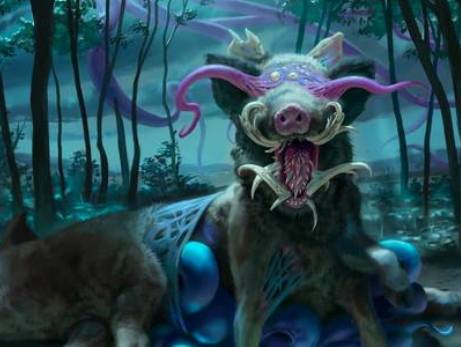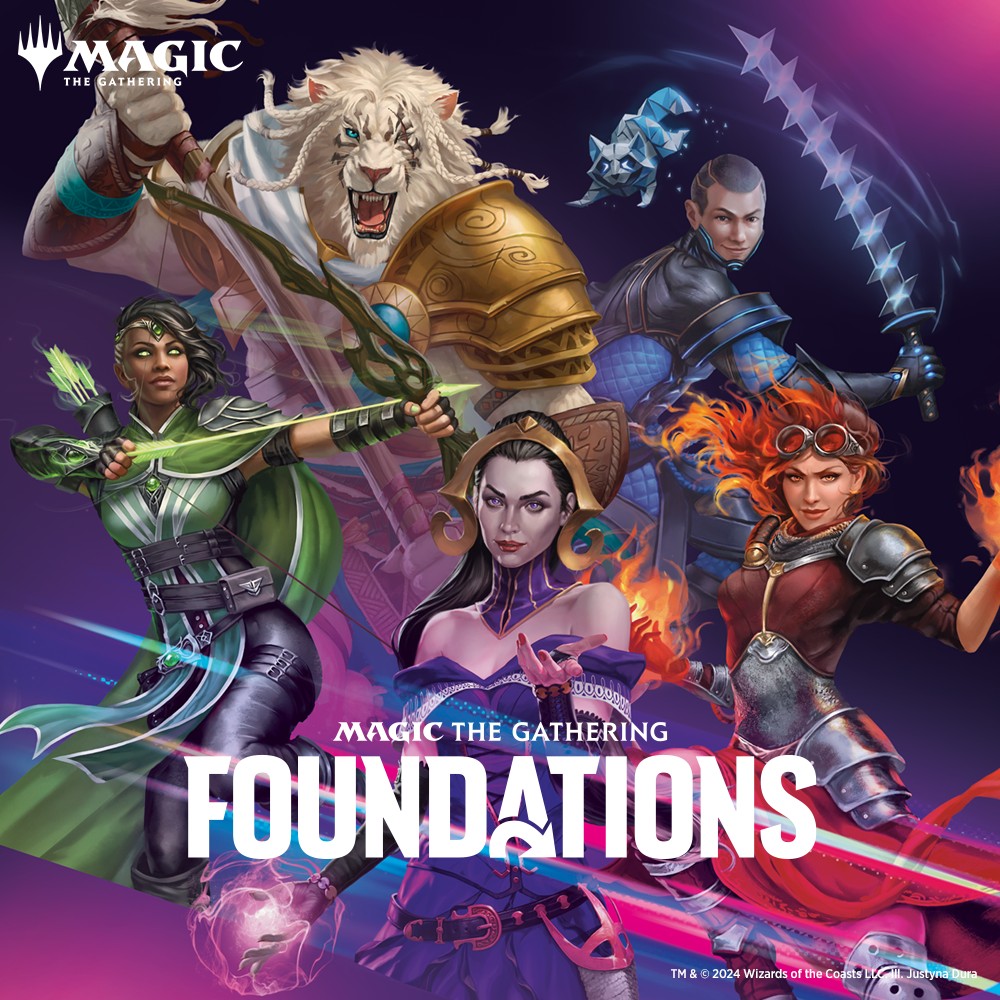Hello and welcome back to Going Rogue, where winning isn't the goal but it often happens anyway.
With Eldritch Moon dropping at the end of the week, it's high time we discuss the potential Modern applications for its most interesting card. Of course, I'm talking about Eldritch Evolution.
This is a brewers fantasy. Totally useless card disadvantage in the average deck, but an absolute build-around with a crazy high ceiling for performance. I've had this card on my mind for a few weeks now, and there are definitely a few different approaches to take with it, too. Let's take a look at a few of them:
Two, Four, Six, Eight, Pod Chains are a Thing I Hate
For those of you who've tried to draft around Birthing Pod, you know what I'm talking about. With Eldritch Evolution, since it gives us a converted mana cost premium of two, it makes sense to extract the most value out of the deck by making our creature curve skip numbers and look like a histogram. The decision simply needs to be whether we go with odds or evens.
Odds
If we start at 1, we get to kick things off with Birds of Paradise, which gives the deck excellent 3-drop support redundancy, casting Kitchen Finks from the hand on turn two, or "Evolving" your Birds into your 3-drop of choice, should you feel it's worth the cost. The real payoff though is being able to reliably evolve a 3-drop into a 5-drop on turn three.
At five, some of our most powerful options include Blood Baron of Vizkopa, Baneslayer Angel, Thundermaw Hellkite, Reveillark, Sigarda, Host of Herons, Sidisi, Undead Vizier, or Dragonlord Ojutai. Things can even get really silly if you've managed to safely put an Evolution into the graveyard (not by casting as it sadly exiles itself), as the 5-drop Goblin Dark-Dwellers can immediately re-evolve itself to jump you up to seven. Not bad.
At seven, the main payoff is Elesh Norn, Grand Cenobite, but also features less-played all-stars like Simic Sky Swallower and Rune-Scarred Demon, depending on how you need the rest of the game to go.
All-in all, playing the odds lets you aspire to an early game Elesh Norn, which is backbreaking against a lot of decks, but has a viable strategy that can revolve around a few choice 5-drops to overpower your enemy early in an otherwise fair-playing midrange deck.
This kind of deck would probably be happy to play some 2-drops and 4-drops as well, to fill in the curve for when you're not evolving all day, probably resulting in some sort of Abzan value pile with an Elesh Norn cherry on top. Shifting to Bant would give us Ojutai and maybe a sideboard Sky-Swallower, and Naya, Jund, or Temur would give us Thundermaw and Dragonlord Atarka. But frankly the decision to go Abzan is fairly obvious.
Evens
Playing it even changes things completely. Not only do we focus on different converted mana costs to populate the deck with, but we also need to find other effective stuff to do on turn one. Thankfully, borrowing a page from Grixis Control gives us a fantastic option in Thought Scour, leading into a delve creature like Tasigur, the Golden Fang.
A turn-two Tasigur has always been good, but what's even better is a turn-three tutorable 8-drop.
[one_third responsive="scale"]
[/one_third]
[one_third responsive="scale"]
[/one_third]
[one_third_last responsive="scale"]
[/one_third_last]
Griseldaddy and Terastodon are probably the best payoff cards in the Sultai build that our set-up cards require. One immediately tilts the board in your favour, regardless of its own survival, and the other is a huge flying lifelinker with a worst-case scenario of drawing seven or more cards. It would be nice to have a wrath effect too, but it looks like Reiver Demon saw us coming.
Distended Mindbender is also a great option here, as it is a perfectly suitable Evolution target against decks with scary things costing four or more, but also because its emerge ability lets it easily be cast from the hand as well, suiting the decks overall approach of gory upgrades.
Thought Scour into Tasigur isn't always going to happen though, so let's look at the rest of the peaks on the chart.
Our creature curve starts at two, naturally. Wall of Roots is a great blocker, and both curves and evolves us into our four slot. Meanwhile, Tarmogoyf is great in a Thought Scour deck, and even though there's not much at four worth upgrading it into, it's a great beater that will occasionally see occasion to evolve. Finally, Snapcaster Mage is a value machine that helps you turn milled Evolutions into your four drop of choice.
At four things can be a little more awkward. Utility options like Murderous Redcap and Nekrataal don't always get their man, and pit stops and lottery tickets like Darkslick Drake, Solemn Simulacrum, and Kathari Remnant are slow for a deck that hopes for a turn three Griselbrand. There are a few good sacrifice-friendly options, though, in Obstinate Baloth and Abyssal Persecutor, and cute sideboard options like Glen Elendra Archmage, Thrun, the Last Troll, and even Silent Arbiter, so not all is lost.
Our six-slot is already populated with our delve creatures (Tasigur and Hooting Mandrills), but there's limited incentive to evolve creatures into them unless you're desperate to kill your Abyssal Persecutor. This slot needs something like either Wurmcoil Engine or Grave Titan as big-impact players that leave pieces behind.
Compared to the Odds version, Evens stumbles up the chain less gracefully, but it has a stronger midrange game as well as higher payoff for drawing well.
It's worth noting that black isn't necessary for this build, as four copies of Hooting Mandrills might be sufficient. Playing Bant instead lets us aspire to something near-unanswerable like Empyrial Archangel, with other niceties along the chain like Voice of Resurgence, Linvala, Keeper of Silence, and Sun Titan all while maintaining their castability. I think I prefer the Sultai route personally, but either is defensible.
All-in Allosaurus
Let's take what we learned from the Tasigur example and think about how else we might pull off an even greater Cheatyface move. The Tasigur route is good for a turn-three 8-drop. What if I'm in the mood for a turn-two 9-drop instead?
Certainly, this is an all-in tactic that is too cute for competitive play, but with a bit of deck engineering, you can land at about a 10% chance of curving Birds of Paradise and a free Allosaurus Rider into a turn-two Iona, Shield of Emeria.
The funny thing about nine is that there's really just the one option, so in the rare case where Iona isn't the card you need, you'll be looking into the eight-or-less range again. Some though, like Sundering Titan, will work better than before, since you're likely to make this deck as mono-green as possible. Meanwhile Terastodon is a better choice against Tron to upset its mana base before Karn Liberated goes angel-hunting.
With the above options in mind, this build isn't necessarily all-in on one interaction, as Hooting Mandrills can still likely come down early enough to matter, and in a deck that's certain to be rich with random bodies, convoke creatures like Siege Wurm aren't the end of the world either.
If this version ever comes creeping around your LGS, keep your Spell Pierce blowouts ready at the side.
Keepsies Reanimator
There's a third and final approach I want to touch on today that was brought to my attention by fellow MTGCanada contributor Darcy Hartwick, which turns our attention back towards Tasigur and Griselbrand. It turns out that on top of being both black and expensive, they share one other valuable trait in common: They're legendary.
Goryo's Vengeance has always been great at scoring a temporary Griselbrand, but what if we want one for keeps?
In addition to the Thought Scour turn three strategy that requires us to cast Tasigur on turn two, now we also have the option to cast Goryo's Vengeance at the end of our opponent's turn to grab our legend of choice to use for our next turn, and when we're done with them, evolve them into something better.
Usually this will mean Tasigur into Griselbrand. But it could also mean Griselbrand into Progenitus.
The upside is we're not reliant on hitting relevant cards with Griselbrand's draw seven - that's really just an insurance policy in case our opponent can take him down. Also, unlike regular reanimator decks, we get a true tutor effect that can help bring in silver bullets like Elesh Norn or Iona out of the sideboard. The downside is we need to introduce double-green into a deck that surely wants to play Grixis for access to Faithless Looting.
It's an interesting take on the archetype, although it begs us to consider if there's enough benefit over the Nourishing Shoal-Worldspine Wurm or Through the Breach-Emrakul variants to consider ever playing it, knowing that the Evolution versions can't win on turn two like those can. I suspect the answer is probably not, but it's certainly worth keeping in mind as more legends are printed into the format.
What's the pick?
For me, it's the Sultai "Evens" build. We get to play already-good cards like Tarmogoyf, Snapcaster Mage, and Abrupt Decay. We have reasonable odds of sticking an early Griselbrand or Terastodon. We're not desperately vulnerable to graveyard hate. And the rest of our beat sticks are aggressive enough to play a strong game even when we're not executing Plan A.
So with that said, this article wouldn't be complete without a deck list, so let's take a peek:
The trick to building this deck is in either overcoming the inherent card disadvantage, or knowing when it's worth it. The trick to playing it is in knowing your matchup, and deciding when its more appropriate to apply pressure rather than interfere with your opponent's gameplan.
For this reason, our main deck threats that we're likely to Eldritch Evolution into are Abyssal Persecutor, Grave Titan, and Griselbrand. The latter two fare well enough against Path to Exile to be worth the risk, and the Persecutor is a terrific upgrade from a Wall of Roots against non-Path aggro and midrange decks, especially since our deck is built to be able to sacrifice it again eventually.
Meanwhile Massacre Wurm answers most aggro decks (and flows beautifully from an Obstinate Baloth, I should add), and Distended Mindbender is going to be terrific against most decks these days, now that the format has slowed.
Our hand disruption is also very important to help slow down aggressive decks, and also peek for counterspells since they are such a blowout against Evolution. Milling our targets away is also a risk, which I've mitigated to an extent by including a Conjurer's Bauble, which also conveniently helps grow our Tarmogoyfs.
Sideboarding
To a large extent, our sideboard is full of silver bullets. There's only so much our main deck can answer. I'll break the choices down by category.
Aggro
A maindeck Obstinate Baloth only goes so far towards beating aggro. In these matchups, we need a strong defensive turn three play, either by relying on Evolution or by ramping into our four slot.
In: Kalitas, Traitor of Ghet, Wurmcoil Engine (unless we're facing Path), Silent Arbiter (boring, but effective), Nekrataal, Terastodon, and for infect or affinity, Ascendant Evincar
Out: Distended Mindbender, Grave Titan (unless we're facing Path), Stubborn Denial, Conjurer's Bauble, and Abyssal Persecutor (unless no Path/Vapor Snag is expected).
Don't get me wrong, it feels terrible to be running Ascendant Evincar in a format where Elesh Norn is an option, but a six-mana black answer is a lot better than a seven-mana white one in this deck. Besides, we have other bombs to go to in other matchups.
Combo
Against combo decks (including Tron), we need to increase pressure, as well as our ability to impact their specific interaction. This will vary a lot from deck to deck, but some of the options include:
- Kalitas, Traitor of Ghet - Abzan Company, and to a lesser extent, Dredge.
- Spellskite - Ad Nauseam, Scapeshift, Storm. Better than nothing.
- Silent Arbiter - Kiki combo.
- Keiga, the Tide Star - One of few ways to proactively beat an Emrakul, the Aeons Torn. Works generally well against non-Path creature-based opponents too.
- Terastodon - Tronlands, Pyromancer Ascension, random stuff like Jeskai Ascendancy.
Adding Glen Elendra Archmage, and increasing disruption/counters helps too.
In terms of what to take out, I'm usually picking among Massacre Wurm, Abrupt Decays, Obstinate Baloth, and Grave Titan.
Control/Tron
Against non-blue opponents, we sort-of blank their removal, as they can't use it to counter the Evolution, and even if they immediately Path your Griselbrand or Distended Mindbender, they've already done good work.
Aainst blue-based control, there's a good case for taking the Evolutions out entirely. You can hardcast Thrun, the Last Troll, Glen Elendra Archmage, and probably Distended Mindbender, all of which are terrific against them. Then again, you have to draw them, and the case may be stronger for simply increasing disruption and hoping for the best. Evaluate this on a case-by-case basis.
Meanwhile against Tron we get an excellent proactive/reactive combination of Distended Mindbender, Terastodon and Clever Impersonator. (Y'know what's great against Karn? Karn.) Sequencing your Evolution sac targets here will be crucial, though, as although Karn is easy enough to deal with, Ugin isn't.
Wrapping Up
As long as I'm not playing against a counter-heavy opponent, I love this deck. It's a ton of fun with the flexibility of approach and the bomb-dropping nature of its gameplan, and it's certainly strong enough to play around with in lower levels of competition. If I get my hands on a set of Evolutions soon enough, expect to see this at an Ottawa-based Modern event near you.
I hope you enjoyed this week's edition of Going Rogue. Until next week, have fun, and may the force be with brew.




